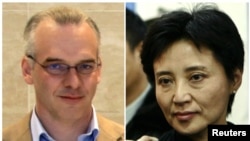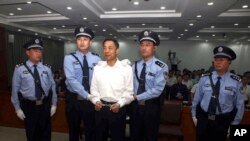A major U.S. newspaper says it has found evidence that a British businessman murdered by the wife of Bo Xilai, once one of China's top politicians, was working as an informant for Britain's spy agency, MI6.
The Wall Street Journal said Tuesday its investigation found that Neil Heywood was providing MI6 information on the Bo family for more than a year before he was murdered last November. The investigation was based on interviews with British officials and friends of Heywood.
2012
2013
Gu Kailai, the wife of former Politburo member Bo Xilai, was convicted in August of murdering the 41-year-old Heywood because of what a Chinese court said was a business dispute. Many of Heywood's friends have said there were inconsistencies with the official account of the murder, which happened in the southwest city of Chongqing, where Bo was party chief.
The British government has tried to distance itself from Heywood, who was previously rumored to have had links to London's spy agency. In April, Foreign Secretary William Hague took the unusual step of commenting on intelligence matters, insisting that Heywood was "not an employee of the British government in any capacity."
The Journal said its investigation found that, although Heywood was not paid or directed by MI6, he was a "willful and knowing informant" of the spy agency. It quoted anonymous officials saying his efforts, which included providing information on Bo's private affairs, had been "useful." But the paper said that British or Chinese officials have not suggested he was killed because of suspected MI6 links.
A freelance business consultant, the flamboyant Heywood is believed to have had connections to the Bo family since the 1990s. Friends say Heywood was always immaculately dressed and even drove around Beijing in a silver Jaguar with license plates reading "007," the code name of the fictional British spy, James Bond.
A China scholar at the University of Nottingham in Britain, Steve Tsang, told VOA it would be a stretch to call Heywood a spy, saying instead he probably only provided information to MI6. Tsang praised the author of The Wall Street Journal article, Jeremy Page.
"I think it’s a great piece of investigative journalism in terms of what the journalist Jeremy Page has found out," he said. "On the other hand, what the story also tells us is that Heywood was not an employee of the British secret intelligence service and that he was not a paid agent of the British secret intelligence service."
Tsang also said Heywood's flamboyance is a sign that he was not a spy.
"Absolutely. I think if Mr. Heywood had been an employee of the secret intelligence service or a paid agent of the secret intelligence service, I think he would have been advised to take a different profile and not advertising that he would like to be 007," he said.
Chinese officials originally said Heywood's death was the result of alcohol poisoning, and his body was quickly cremated. But in February, Bo's ex-police chief Wang Lijun fled to a U.S. consulate in Chengdu and told diplomatic officials he had information on Gu's involvement in the murder. Gu was later given a suspended death sentence for the murder, while Wang was convicted of attempted defection, abuse of power and taking bribes.
The scandal wrecked the career of Bo, a rising star in Chinese politics, who was once considered a favorite for a top post in a once-a-decade leadership transition that begins this week. Bo has been expelled from the Communist Party and is under investigation for charges including corruption and interfering with Heywood's murder investigation.
The Wall Street Journal said Tuesday its investigation found that Neil Heywood was providing MI6 information on the Bo family for more than a year before he was murdered last November. The investigation was based on interviews with British officials and friends of Heywood.
Timeline of the Bo Xilai Scandal
Timeline of the Bo Xilai Scandal2012
- February 2: Bo's key ally and Chongqing police chief Wang Lijun is demoted
- February 6: Wang visits U.S. consulate in Chengdu
- March 15: Bo dismissed as Chongqing party chief
- March 26: Britain asks China to investigate November death of Briton Neil Heywood in Chongqing
- April 10: Bo suspended from Communist Party posts. China says Gu is being investigated for Heywood's death
- August 20: Gu given suspended death sentence after confessing to Heywood's murder
- September 24: Wang convicted of defection, power abuse and bribe taking
- September 28: Communist Party expels Bo
2013
- July 25: Bo indicted for bribery, corruption, abuse of power
- August 22: Bo trial begins in Jinan
- September 22: Bo sentenced to life in prison
The British government has tried to distance itself from Heywood, who was previously rumored to have had links to London's spy agency. In April, Foreign Secretary William Hague took the unusual step of commenting on intelligence matters, insisting that Heywood was "not an employee of the British government in any capacity."
The Journal said its investigation found that, although Heywood was not paid or directed by MI6, he was a "willful and knowing informant" of the spy agency. It quoted anonymous officials saying his efforts, which included providing information on Bo's private affairs, had been "useful." But the paper said that British or Chinese officials have not suggested he was killed because of suspected MI6 links.
A freelance business consultant, the flamboyant Heywood is believed to have had connections to the Bo family since the 1990s. Friends say Heywood was always immaculately dressed and even drove around Beijing in a silver Jaguar with license plates reading "007," the code name of the fictional British spy, James Bond.
A China scholar at the University of Nottingham in Britain, Steve Tsang, told VOA it would be a stretch to call Heywood a spy, saying instead he probably only provided information to MI6. Tsang praised the author of The Wall Street Journal article, Jeremy Page.
"I think it’s a great piece of investigative journalism in terms of what the journalist Jeremy Page has found out," he said. "On the other hand, what the story also tells us is that Heywood was not an employee of the British secret intelligence service and that he was not a paid agent of the British secret intelligence service."
Tsang also said Heywood's flamboyance is a sign that he was not a spy.
"Absolutely. I think if Mr. Heywood had been an employee of the secret intelligence service or a paid agent of the secret intelligence service, I think he would have been advised to take a different profile and not advertising that he would like to be 007," he said.
Chinese officials originally said Heywood's death was the result of alcohol poisoning, and his body was quickly cremated. But in February, Bo's ex-police chief Wang Lijun fled to a U.S. consulate in Chengdu and told diplomatic officials he had information on Gu's involvement in the murder. Gu was later given a suspended death sentence for the murder, while Wang was convicted of attempted defection, abuse of power and taking bribes.
The scandal wrecked the career of Bo, a rising star in Chinese politics, who was once considered a favorite for a top post in a once-a-decade leadership transition that begins this week. Bo has been expelled from the Communist Party and is under investigation for charges including corruption and interfering with Heywood's murder investigation.






